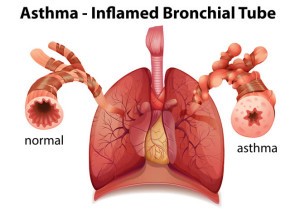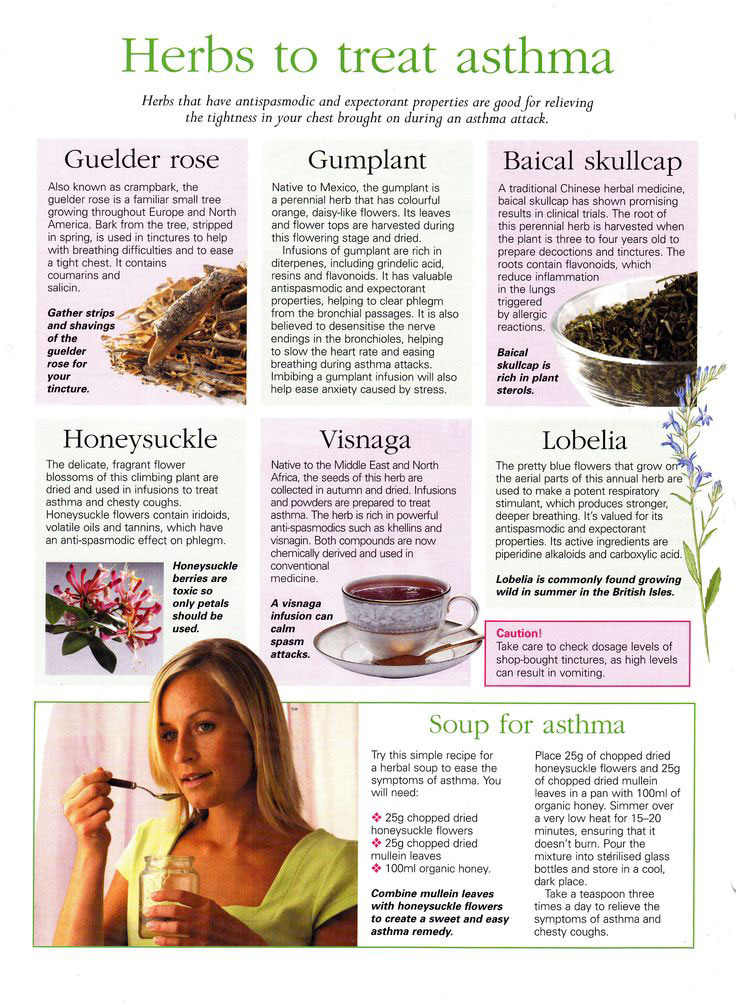Herbs to Treat Asthma

Asthma is characterized by inflammation of the bronchial tubes with increased production of sticky secretions inside the tubes. People with asthma experience symptoms when the airways tighten, inflame, or fill with mucus.
The exact cause of this disease is not known but it can be triggered by allergies, air pollution, respiratory infections, emotions, weather conditions, sulfites in food and certain medications.

Common asthma symptoms include:
* Coughing, especially at night
* Wheezing
* Shortness of breath
* Chest tightness, pain, or pressure
While some alternative remedies are used for asthma, in most cases more research is needed to see how well they work and to measure the extent of possible side effects.
Alternative asthma treatments include:
Breathing techniques. These exercises may reduce the amount of medication you need to keep your asthma symptoms under control. Yoga classes increase fitness and reduce stress, which may help with asthma as well.
Acupuncture. This technique involves placing very thin needles at strategic points on your body. It’s safe and generally painless.
Relaxation techniques. Techniques such as meditation, biofeedback, hypnosis and progressive muscle relaxation may help with asthma by reducing tension and stress.
Herbal and natural remedies. A few herbal and natural remedies that may help improve asthma symptoms include caffeine, magnesium and pycnogenol. Blends of different types of herbs are commonly used in traditional Chinese, Indian and Japanese medicine. However, more studies are needed to determine how well herbal remedies and preparations work for asthma.
Omega-3 fatty acids. Found in fish, flaxseed and other foods, these healthy oils may reduce the inflammation that leads to asthma symptoms.
A number of herbs have been used as natural remedies for asthma. You should consult your health practitioner before before using these asthma treatments. Some alternative treatment options and their associated risks and benefits include:
Garlic. Garlic has been used as a natural remedy to manage many diseases, particularly cardiovascular disease, because of its anti-inflammatory properties. Since asthma is an inflammatory disease, it would make sense that garlic may also help relieve asthma symptoms. However, there has never been any controlled studies investigating the effect of garlic on asthma symptoms, so its role in asthma treatment is unknown. The use of garlic as an alternative treatment for asthma is, however, currently being studied.
Ginger. Ginger is also thought to decrease inflammation, and a recent study did show that oral ginger supplements were linked to improvement in asthma symptoms. The study didn’t show, however, that ginger use led to any improvement in actual lung function. Additional studies are now being conducted to evaluate more fully whether or not ginger may help manage asthma symptoms.
Echinacea and Licorice Root. One study that examined the use of a number of different herbs to treat asthma found that Echinacea — an herb often used to treat upper respiratory infections — was not only ineffective, but was also associated with a number of side effects. Worsening asthma symptoms, skin rashes and possible liver damage when taken with other medications are risks linked to Echinacea use. Likewise, licorice root — which has anti-inflammatory and antioxidant properties and is sometimes used by people with asthma to soothe their lungs — was found to be ineffective as an alternative treatment for asthma and was also associated with side effects such as high blood pressure. There has not been any clinical trials that have shown either Echinacea or licorice root to be an effective asthma treatment. In fact, there has been some reports that Echinacea may worsen asthma symptoms in some people.
Turmeric. Turmeric has been the subject of a number of studies, and it has been found to have some anti-allergy properties. It’s thought that turmeric has an effect on histamines, which can cause inflammation. Nevertheless, much more research needs to be done before turmeric can be established as a safe and effective natural remedy for asthma.
Honey. Honey is an ingredient in many cough and cold remedies, used to help sooth an irritated throat and calm a cough. Many people with asthma may try mixing honey with a hot drink for relief, but again, there are no studies to support the use of honey as an alternative treatment for asthma symptoms.

>>>>Take a look at this natural remedy that has helped thousands of people who were suffered from Asthma attacks: Asthma Natural Remedy





![[QUICK GUIDE] Too Much Sodium](https://www.forevernaturalwellness.com/wp-content/uploads/2017/05/salt-51973_1280-150x150.jpg)







